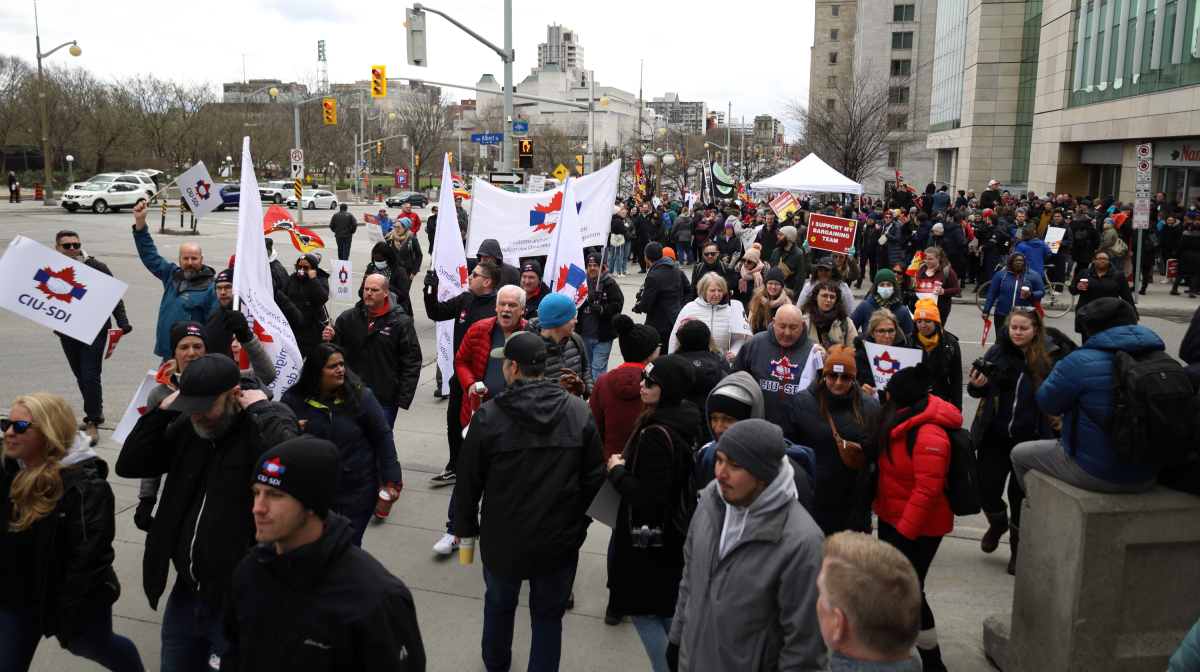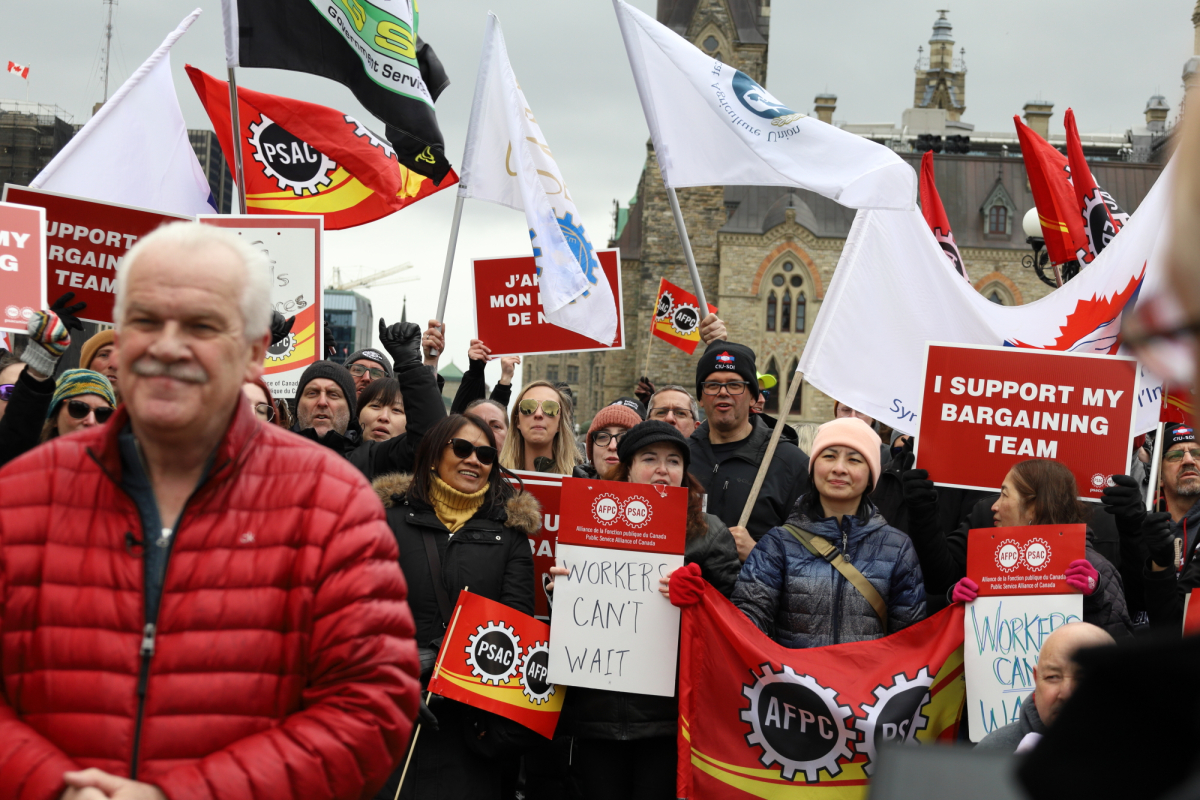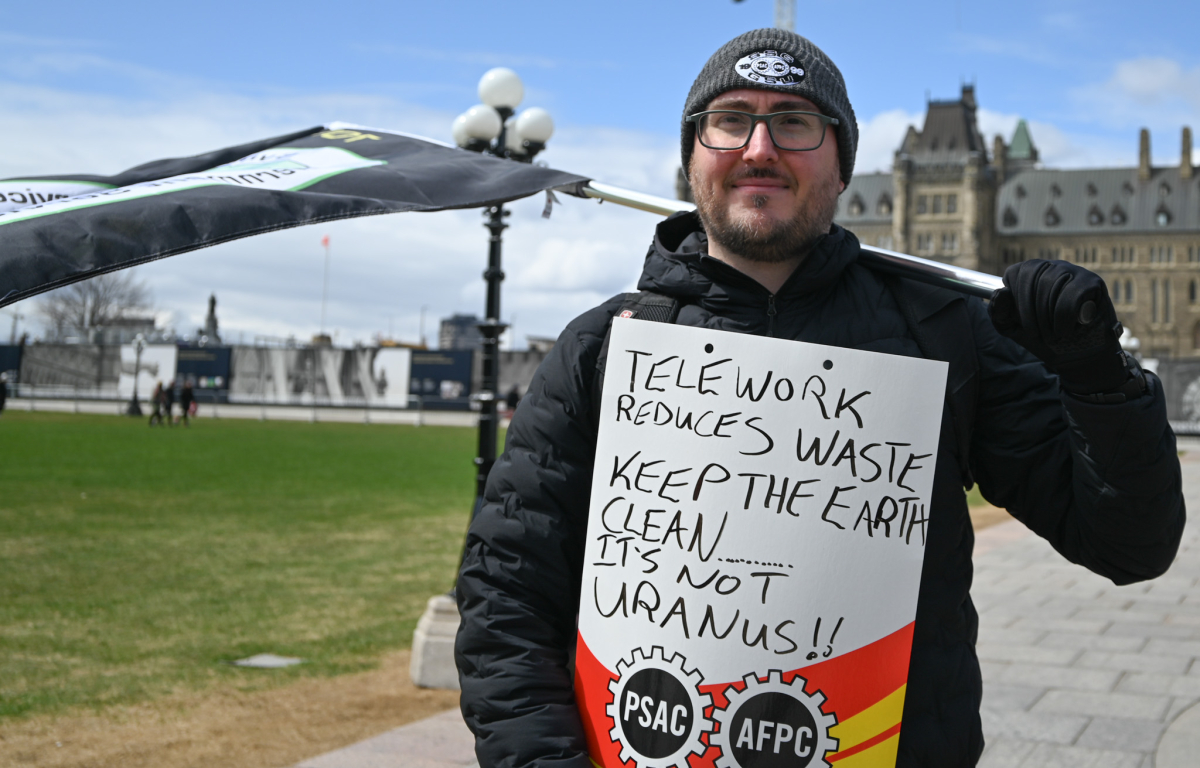PSAC workers dig in
Alex Silas, the Public Service Alliance of Canada's regional executive vice-president poses for a photo at Parliament Hill on April 19, 2023. Photo by Matteo Cimellaro
Alex Silas was among the many federal public service workers outside Treasury Board president Mona Fortier’s office before eight o’clock Wednesday morning with flags, microphones and coffee.
The picket line was fired up and eager to strike after the federal government failed to reach an agreement with the country's largest federal public service union, Silas, the union’s regional executive vice-president, told Canada’s National Observer.
The Public Service Alliance of Canada (PSAC) announced a nationwide strike on Tuesday, naming more than 250 picket locations. Thousands of workers were striking Wednesday, including on Parliament Hill.

Wage increases, the right to disconnect, overtime and remote work are key issues at the bargaining table, where the two sides have not yet negotiated a deal.
Silas says the Liberal government is acting hypocritically by presenting themselves as pro-worker and pro-union. He argues Fortier, who heads the agency representing the federal government in negotiations, should keep her focus on the bargaining table rather than on the public.
“What I think about Mona Fortier’s tenure as Treasury Board president? I think she has been absent, I think she's been lacking in a mandate. I think she's made a lot of declarations and statements on Twitter. But where we need to get talking is at the bargaining table, not on Twitter, not in the media,” Silas said.

At a Wednesday news conference, Fortier said she recognizes and respects the right to strike, “but when a good offer is on the table, and there is a genuine commitment to compromise, the focus should be on negotiation.”
‘Workers can't wait’
“We truly hoped we wouldn’t be forced to take strike action, but we’ve exhausted every other avenue to reach a fair contract for Canada’s federal public service workers,” said Chris Aylward, PSAC national president in a news release. Photo by Natasha Bulowski
PSAC wants a 13.5 per cent wage increase over three years in increments of 4.5 per cent per year. The federal government is offering nine per cent over three years.
Canada's annual inflation rate hit 4.3 per cent in March, which is the lowest it's been since August 2021.
The deal these federal employees are currently being offered is, in reality, a pay cut, the Canadian Labour Congress said in a media release Wednesday. The Canada Revenue Agency’s bargaining unit, part of the Union of Taxation Employees, is asking for a nearly 30 per cent wage increase over three years for its more than 35,000 members.
Workers are asking for the steep wage increase to ensure that salary pay grades match other agencies, particularly the Canada Border Services Agency, which used to function as part of the same agency as CRA, with workers receiving similar salaries between 1999 and 2003, according to CBC News.

“If this government wants to present itself as pro-worker, their opportunity to do that is by putting something fair on the table,” Silas said.
“It’s clear the only way we’ll achieve that is by taking strike action to show the government that workers can’t wait,” Chris Aylward, PSAC national president, said in a news release.
Voices from the picket line
Striking federal public service workers chanting and waving flags and banners at Parliament Hill on April 19, 2023. Photo by Natasha Bulowski
Canada's National Observer spoke with several people striking on Parliament Hill Wednesday. Here's what they had to say:

Adrianna Haines, executive administrator at Health Canada, on why she’s on the picket line:
“It’s important because they want to remove things out of our clauses that we fought so hard for, and I don't think that that's right. Also, the cost of living and groceries and everything — as you've seen, inflation is taking a toll. All we're asking for is 2.5 per cent for each year as inflation comes with, which is pretty much what the rent hike is — so it's to match that, so we're not, like, homeless.”

Alex, a worker for the Canadian Coast Guard who declined to give his last name, on the first day of strike action:
“There's definitely excitement — we haven't been on a general strike like this in years. But people are also fairly hopeful. I think that we'll be able to make our voices heard. I think there's a little disappointment that only our union sector came out for this, but we had this massive show of support from the other unions [in our sector].”

Kevin Hanson, a worker at Public Services and Procurement Canada, on how climate factors into his strike action:
“We're trying to fight for telework and our collective agreements. Telework helps preserve the environment, and I think telework will help us fight climate change… in terms of carbon emissions, less people on the roads means less emissions emitted. It also means less waste, people have a chance to make food in their houses versus actually buying food and using wrappers and plastics.”
